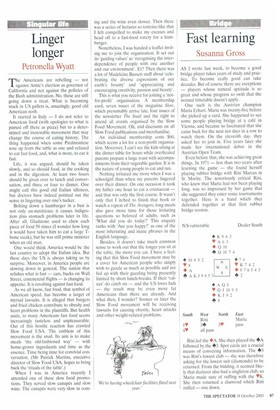Linger longer
Petronella Wyatt
The Americans are rebelling — not against Arnie's election as governor of California and not against the policies of the Bush administration. No, these are still going down a treat. What is becoming stuck in US gullets is, amazingly, good old American nosh.
It started in Italy — I do not refer to American food (with apologies to what is passed off there as pizza) but to a determined and inexorable movement that may change the course of eating history. The thing happened when some Piedmontese rose up from the table as one and refused to eat fast food, and, what is more, to eat it fast.
Life, it was argued, should be taken slowly, and so should food, in the cooking and in the digestion. At least two hours should be given over to lunch and conversation, and three or four to dinner. One might call this good old Italian idleness, but doctors have indeed pointed out the sense in lingering over one's tucker.
Bolting down a hamburger in a bun is not only un-nutritious; it causes indigestion plus stomach problems later in life. After all, Gladstone used to chew each piece of food 50 times (I wonder how long it would have taken him to eat a large Tbone steak), but he was still prime minister when an old man.
One would think America would be the last country to adopt the Italian idea. But these days the US is always taking us by surprise. Moreover, in America people are slowing down in general. The nation that relishes what is fast — cars, bucks on Wall Street, commercial flights — is changing its appetite. It is revolting against fast food.
As we all know, fast food, that symbol of American speed, has become a target of myriad lawsuits. It is alleged that burgers and fried chicken contribute to obesity and heart problems in the plaintiffs. But health aside, to many Americans fast food seems increasingly tasteless and unpleasurable. Out of this hostile reaction has crawled Slow Food USA. The emblem of this movement is the snail. Its aim is to make meals 'the old-fashioned way' — with home-grown ingredients and time as the essence. Time being time for convivial conversation. (Mr Patrick Martins, executive director of Slow Food USA, hopes to bring back the 'rituals of the table'.)
When I was in America recently I attended one of these slow food promotions. They served slow canapes and slow wine. The canapes were very slow in corn
ing and the wine even slower. Then there was a series of lectures so tortoise-like that I felt compelled to make my excuses and head off to a fast-food eatery for a hamburger.
Nonetheless, I was handed a leaflet inviting me to join the organisation. It set out its 'guiding values' as 'recognising the interdependence of people with one another and our environment'. Er? Then there was a lot of Madeleine Bassett stuff about 'celebrating the diverse expressions of our earth's bounty' and 'appreciating and encouraging creativity, passion and beauty'.
This is what you receive for joining a 'notfor-profit' organisation. A membership card, seven issues of the magazine Slow, which presumably arrive late, four issues of the newsletter The Snail and the right to attend all events organised by the Slow Food Movement. Oh, and discounts on all Slow Food publications and merchandise.
An individual membership costs $60, which seems a lot for a non-profit organisation. Moreover, I can't see the kids sitting at the dinner table for hours while overheated parents prepare a large roast with accompaniments from their vegetable garden. It is in the nature of young people to eat and run.
Nothing irritated me more when I was a schoolgirl than when my parents lingered over their dinner. On one occasion it took my father one hour to eat a crustacean — and that was only the first course. It wasn't only that I itched to finish that book or watch a repeat of The Avengers; long meals also gave more time for those irritating questions so beloved of adults, such as 'What did you do today?' This enquiry ranks with 'Are you happy?' as one of the most infuriating and inane phrases in the English language.
Besides, it doesn't take much common sense to work out that the longer you sit at the table, the more you eat. I have a feeling that this Slow Food movement may be a cover for American people who simply wish to guzzle as much as possible and are fed up with their guzzling being presently limited by short lunch-breaks. If their 'values' do catch on — and the US loves fads — the result may be even more fat Americans than there are already. And what then, I wonder? Sooner or later the Slow Food movement will be receiving lawsuits for causing obesity, heart attacks and other weight-related problems.


































































































 Previous page
Previous page